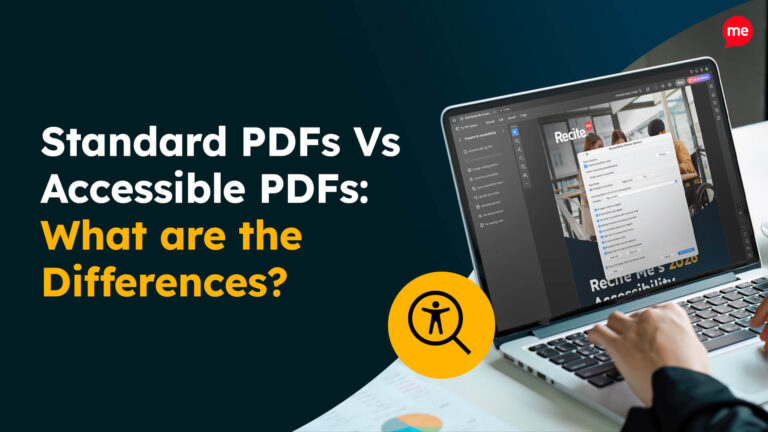Get A Free AODA Compliance Audit Of Your Website
Run Audit NowThe Accessibility for Ontarians with Disabilities Act (AODA) is a landmark piece of legislation ensuring accessibility and inclusivity for all Ontarians, regardless of ability. To avoid negative press and repercussions, it is crucial that your organization meets the required standards and that you understand the potential penalties for non-compliance.
Who Must Comply with AODA?
AODA standards apply to all public-facing websites, mobile sites, documents, and social media content. The legislation applies to both public and private entities, encompassing municipalities, ministries and agencies of the Ontario government, nonprofits, and private businesses.
There are various tiers of compliance based on business size and type. Business size is determined by the number of employees you have. So, that’s the first thing you should clarify. In the context of AODA, your employee count includes all full-time, part-time, seasonal, and contract workers. It does not include volunteers, independent freelance workers, or out-of-state employees.
Got your up-to-date employee count? Great! Then, here is an overview of your requirements.
Private Entities with Fewer than 20 Employees
- Create accessibility policies. There’s no official requirement for them to be documents, but it’s recommended nonetheless.
- Train staff and volunteers on the Ontario Human Rights Code, accessible customer service, and any specific accessibility requirements that apply to their roles.
- Plan for accessible self-service kiosks, if applicable.
- Provide accessible customer service
- Implement accessible employment practices
- Provide accessible public information.
- Provide accessible education and training resources.
- Ensure accessible public spaces.
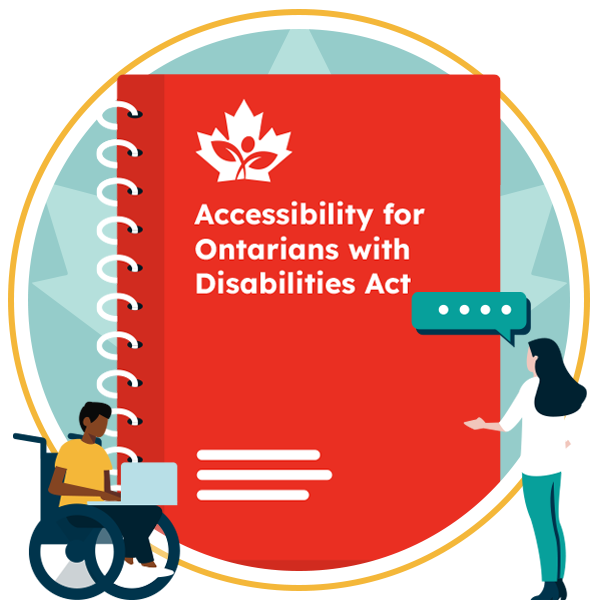
Private Entities with 20-49 Employees
SMEs must do all of the above, plus file an accessibility compliance report every three years.
Private Entities with 50+ Employees
Large businesses must also comply with the basic requirements listed above, plus:
- File an accessibility compliance report every three years.
- Document their accessibility policies.
- Create a multi-year accessibility plan.

Public Sector Organizations
- File an accessibility compliance report every two years.
- Create documented accessibility policies and a multi-year plan.
- Submit an annual status report.
- Train staff and volunteers on the Ontario Human Rights Code, accessible customer service, and any specific accessibility requirements that apply to their roles.
- Buy accessible goods, services and facilities.
- Plan for accessible self-service kiosks, if applicable.
- Provide accessible customer service
- Implement accessible employment practices
- Provide accessible public information.
- Provide accessible education and training resources.
- Have an accessible website.
- Provide accessible transportation services.
- Ensure accessible public spaces.
AODA Deadlines
Businesses and nonprofits with 20 or more employees should have filed their first accessibility report by December 31st, 2023. The deadline for designated public sector organizations to file an accessibility compliance report is December 31, 2025.
Get a free automated AODA compliance audit of your website. This audit will highlight compliance violations and provide the recommendations needed to meet AODA compliance standards.
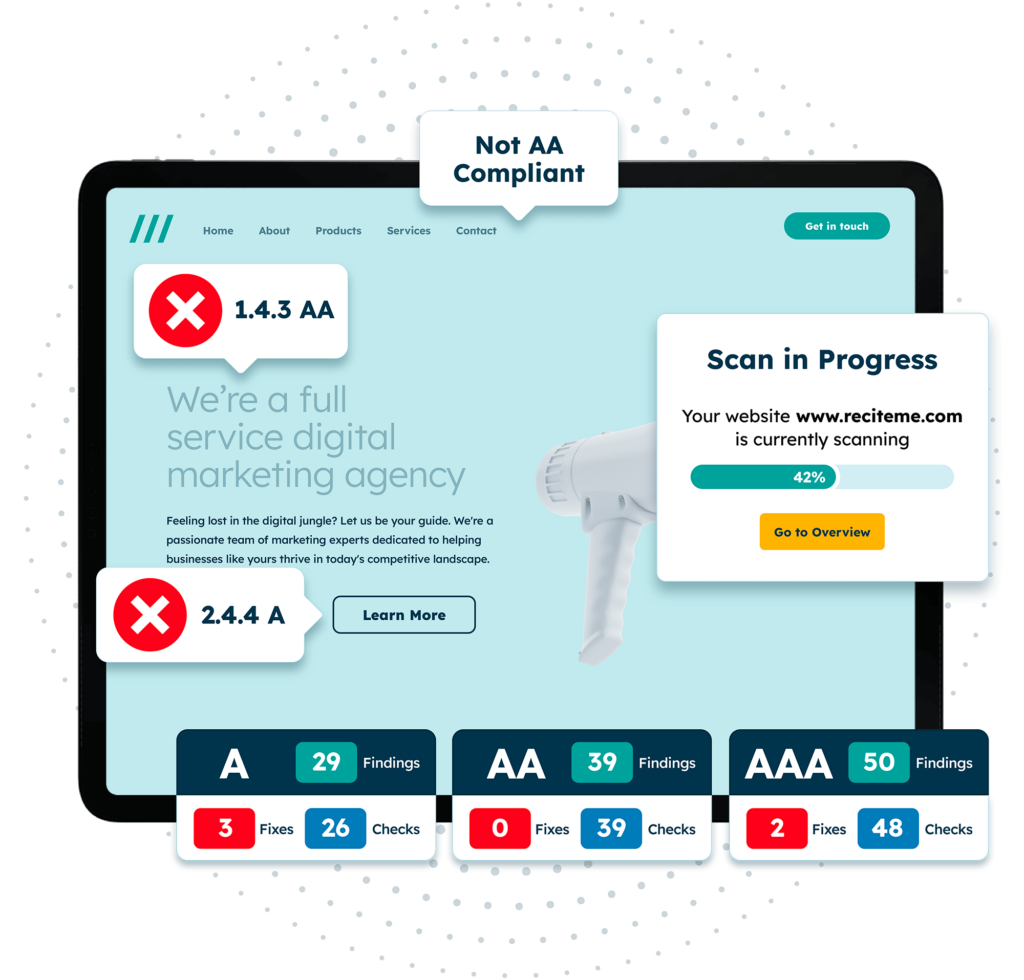
AODA Compliance Requirements
Public-facing websites were expected to meet the Web Content Accessibility Guidelines (WCAG) version 2.0, Level AA, by January 1st 2025. WCAG is the global gold standard for website accessibility. WCAG provides structured criteria, ensuring digital content, including forms, images, and multimedia, is accessible to people with disabilities.
Additionally, businesses must provide accessible ways for customers to offer feedback, express their opinions, and report issues without barriers. Plus, Ontario employers are required to make reasonable accommodations for candidates and employees with disabilities.
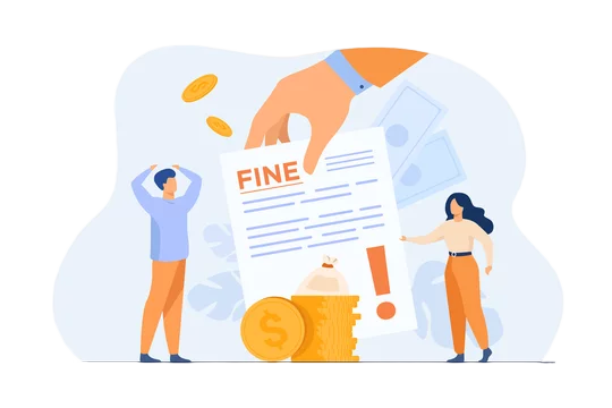
AODA Fines and Penalties
Penalty amounts vary depending on the severity of the violation and your organization’s history of non-compliance. Maximum fines are as follows:
- Unincorporated organizations: Up to $50,000 per day.
- Corporations: Up to $100,000 per day.
- Directors and officers of a corporation with fiduciary responsibility: Up to $50,000 per day.
While these non-compliance penalties may seem steep, they are designed to incentivize organizations to prioritize accessibility. Moreover, the fines are intended to cover issues such as accessibility audits, website improvements, training programs, and other related expenses.
What Could Trigger an AODA Fine?
Common compliance failures that could trigger AODA fines include:
- Inaccessible websites that don’t meet WCAG 2.0 Level AA guidelines.
- Not having an up-to-date accessibility policy.
- Failure to submit accessibility compliance reports or status update reports.
- Failure to provide adequate volunteer and employee training.
- Failure to provide accessible spaces and facilities.
- Failure to provide reasonable accommodations for individuals with disabilities.
Enforcement methods include inspections, audits, and investigations. Additionally, individuals with disabilities can file complaints about violations directly with the Ontario government, making compliance even more essential.
How to Avoid AODA Lawsuits and Fines?
Here’s a comprehensive list of key actions your organization can take to help avoid AODA lawsuits and fines:

- Document your accessibility policies: Even if it’s not officially required, having clear policies provides a reference point for any compliance inquiries or audits.
- Conduct regular accessibility audits: Regular audits help you identify accessibility gaps in your website, services, and facilities.
- Ensure compliance with WCAG 2.0 Level AA: Implementing best practices that meet WCAG criteria helps your site become fully accessible.
- Keep up-to-date with team training: Provide ongoing training to ensure your teams know how to assist individuals with disabilities effectively.
- Adopt inclusive marketing best practices: Ensure all marketing materials, both digital and print, are accessible to individuals with disabilities.
- Design inclusive recruitment, onboarding, and ongoing training processes: Develop policies that ensure inclusive candidate journeys and provide reasonable accommodations for employees with disabilities.
- Continuous development: Regularly review and update your accessibility policies to align with the latest AODA regulations.
If you’re unsure how to proceed with any area of AODA compliance, working with a third-party accessibility expert is a great way to tap into expert-level knowledge and build a robust AODA compliance checklist.
Our 40-page Digital Accessibility & Inclusion Toolkit helps businesses break down online barriers and make a real impact. It offers practical advice on all aspects of digital accessibility, from writing an accessibility statement to accessible website tips and inclusive hiring.
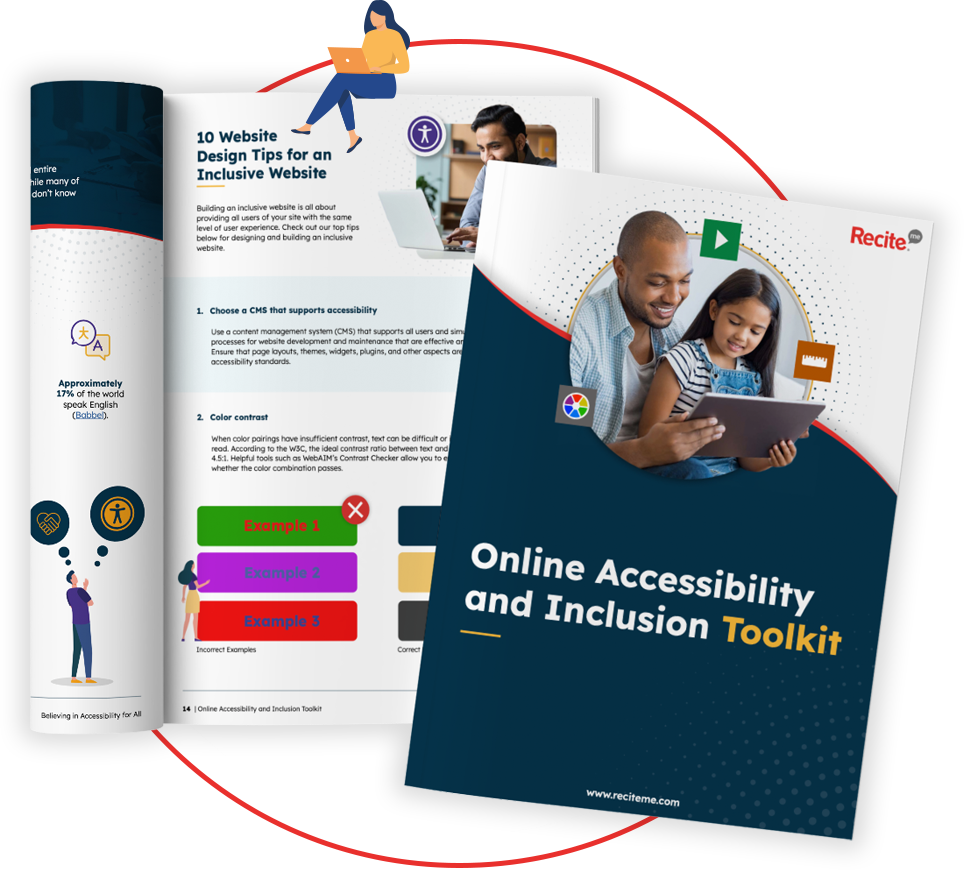
Protect Your Organization with Proactive AODA Compliance
The AODA is clear in its mission to ensure that Ontarians of all abilities can access the services, information, and opportunities they deserve. The potential penalties for non-compliance are substantial, so it’s vital you take proactive steps to avoid the risk of lawsuits, fines, and negative PR.
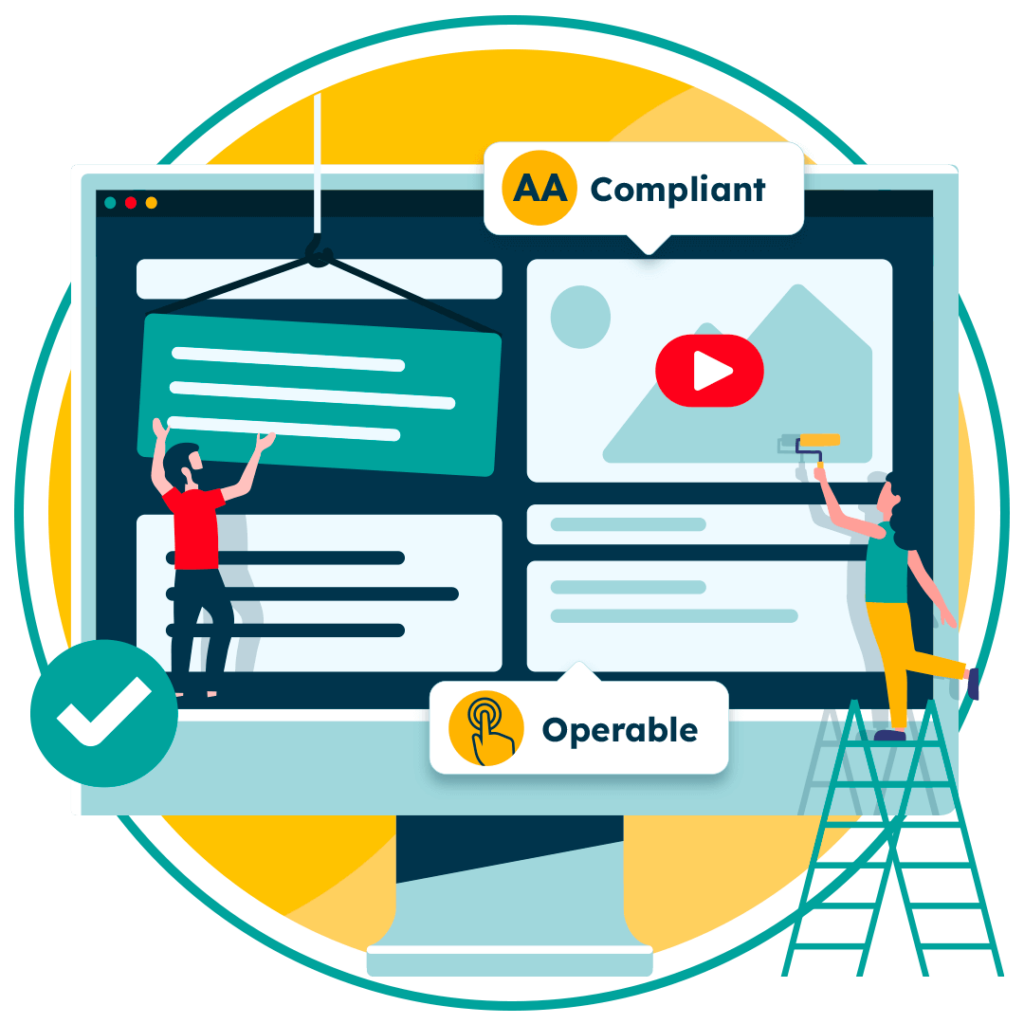
Recite Me is on hand to help you navigate the complexities of AODA compliance with ease. We offer a range of tools and services to guide you on your accessibility journey and ensure your organization meets all required standards.
Contact our team today to learn more and discuss your needs.
AODA Fines and Penalties FAQs
Looking for a recap or quick summary? Here are a few of our most frequently asked questions to help you get to grips with the essentials.
Who needs to comply with AODA?
Most Ontarian enterprises must comply. However, the rules vary depending on whether your organization is a public or private entity and the number of employees you have.
What are the key differences in compliance based on business size?
Businesses with fewer than 20 employees have fewer obligations but still must meet certain standards. SMEs with 20-49 employees must submit a compliance report every three years in addition to meeting basic AODA criteria. Meanwhile, large companies with 50 or more employees must do all of this, and document their policies, create longer-term accessibility plans, and submit annual reports.
How do I count my employees?
Your employee count should include all full-time, part-time, seasonal, and contract workers. Volunteers, independent freelancers, and out-of-state employees do not count toward your total.
What are the risks of non-compliance?
Individuals and unincorporated businesses can face fines of up to $50,000 per day, while corporations may be liable for penalties of up to $100,000 per day.
How can I avoid AODA fines?
Conduct regular accessibility audits, ensure your website meets WCAG 2.0 standards, provide employee training, and submit accessibility compliance reports on time. If in doubt, consult with third-party accessibility experts to ensure optimum compliance and peace of mind.
Check out our Products & Services
Ready to take your first steps towards digital accessibility compliance? Then see how we can support your journey with our accessibility solutions:
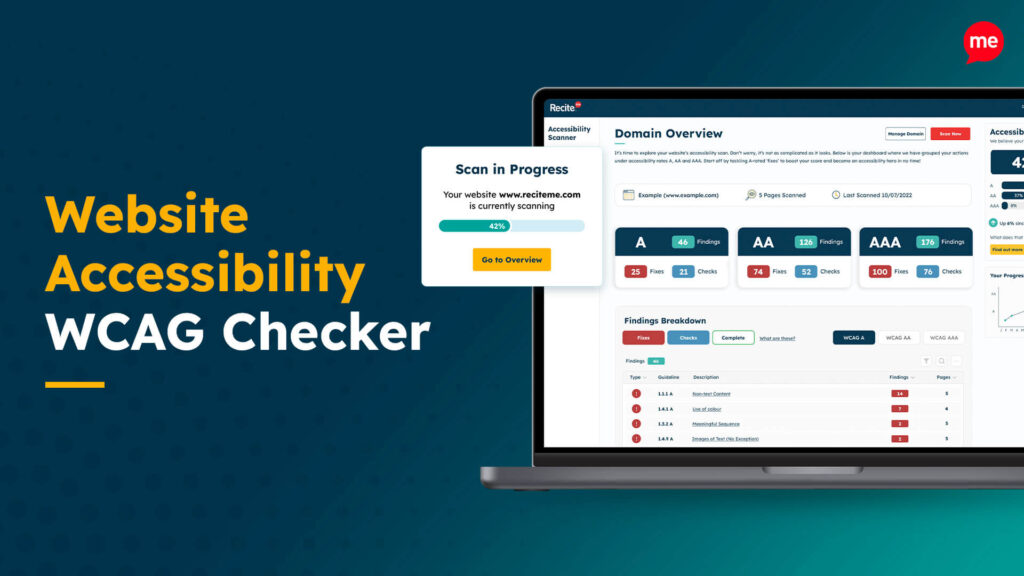
Web Accessibility Checker
Scan, detect, fix, and maintain accessibility compliance standards on your website.
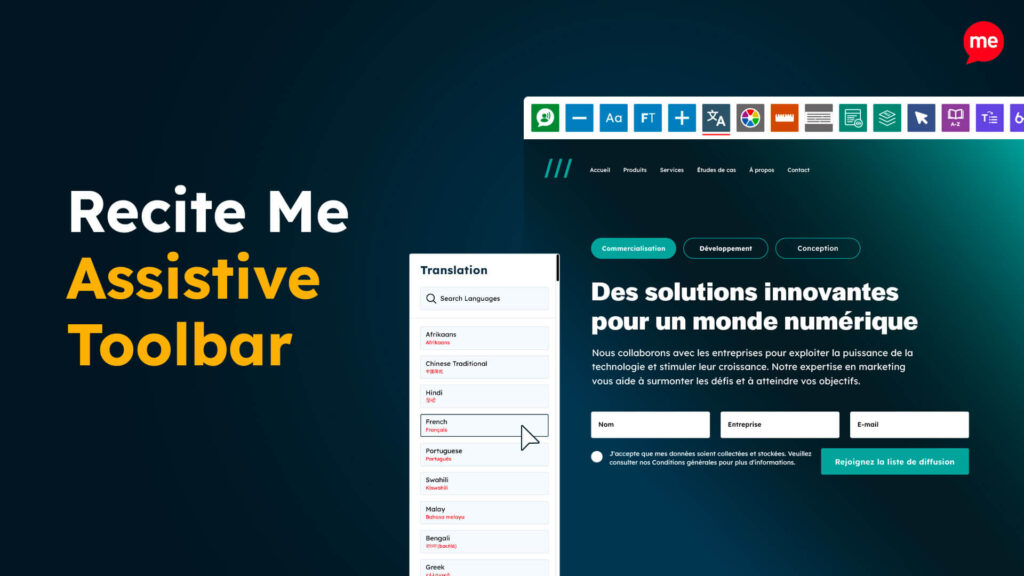
Assistive Toolbar
Make your website an inclusive and customizable experience for people with disabilities.

PDF Accessibility Checker
Check your PDFs are compliant with accessibility standards and run automated fixes.



